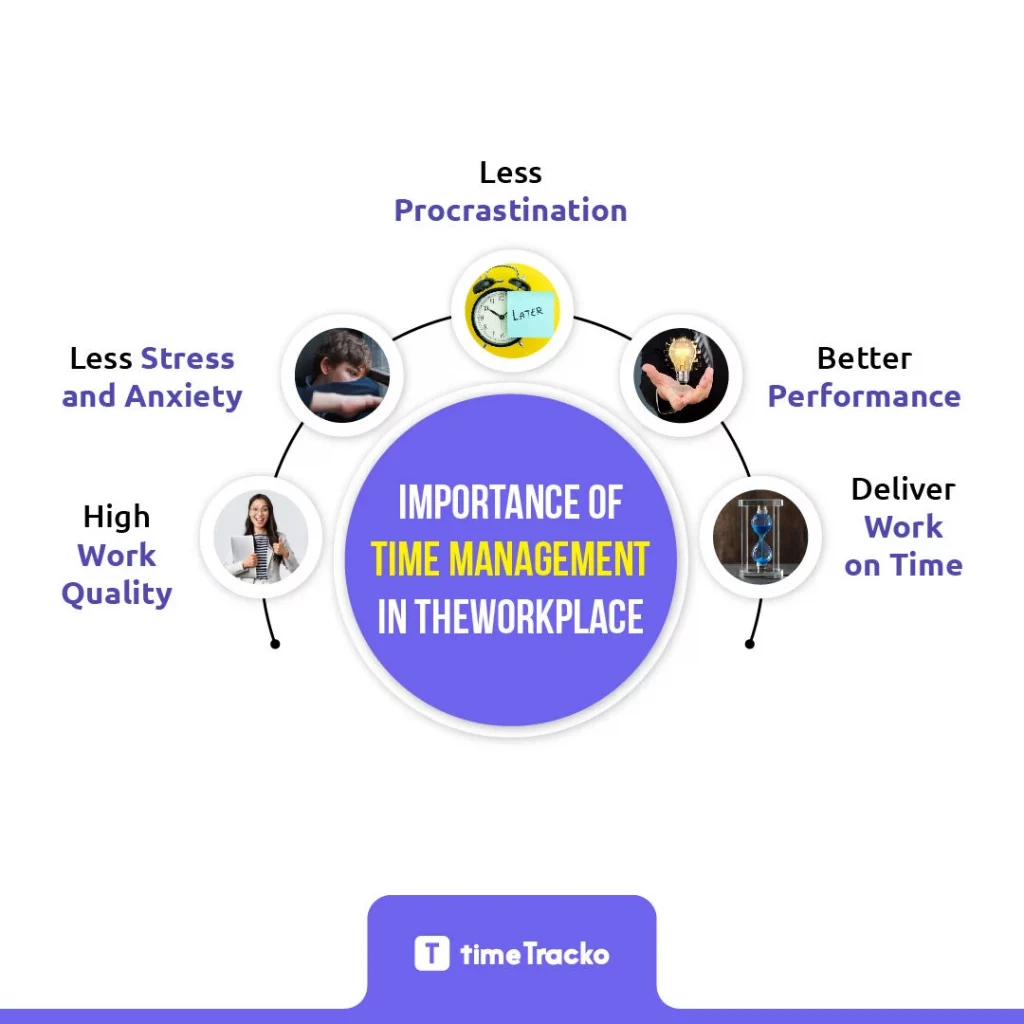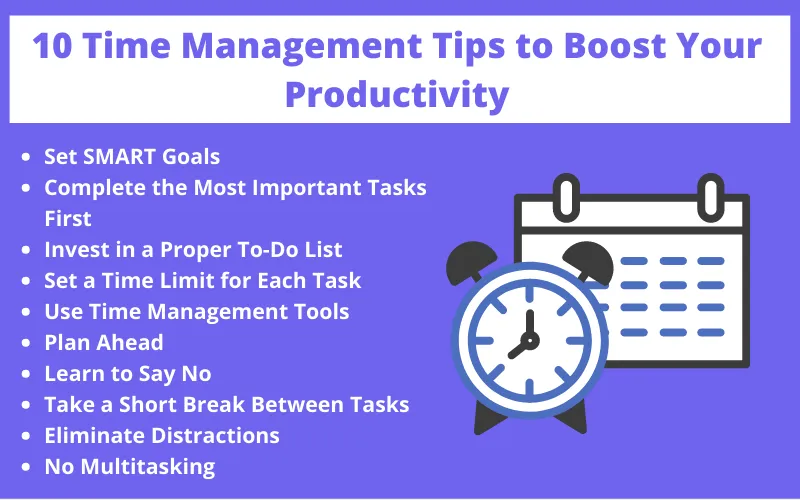10 Time Management Tips to Boost Your Productivity
10 Time Management Tips to Boost Your Productivity
Each of us has 24 hours in a day. You may have noticed some people around you who accomplish everything they need to with plenty of time left.
How are they able to accomplish so much in such a short time? The answer is they know how to manage their time properly.
No matter how hard you work to be more productive, you always feel like there is so much to do and not enough hours in the day.
It is because you are not managing your time effectively. Here are 10 time management tips for managing your time more effectively.
Why Time Management is Important?

Time Management is organizing and dividing time between activities to maximize productivity and achieve goals.
We all need to be able to manage our time effectively. We experience a decline in productivity and increased stress levels when we do not manage our time well.
Good time management can reduce stress, increase job performance, improve life satisfaction, and help you reach your goals faster.
Having control over how you spend your time is one of the most significant advantages of time management. You can focus on important tasks and become more efficient.
When you manage your time wisely, you can improve your work-life balance and increase your happiness. You can work smarter and achieve more in less time by managing your time effectively.
Please read our article on the Importance of Time Management in the Workplace for more detailed information.
10 Time Management Tips to Boost Your Productivity
You can’t manage your life without managing your time. The more you take control of your time, the more you control your lives.
Have you ever spent your day in a flurry of activity and wondered why you aren’t accomplishing much? If so, then these time management tips are for you – they will help you stay focused and productive.

Set SMART Goals
Goals provide a sense of motivation, direction, focus, and importance clarity. Setting goals gives you a target to strive for. Setting goals is a complex process.
There are both wrong ways and right ways to set goals. If you do not see results from your goals, something is wrong with your approach. While setting goals properly can help you improve your productivity.
Set SMART goals: Specific, Measurable, Achievable, Realistic, and Time-bound. By setting SMART goals, you can clarify your objectives, focus your efforts, use your time and resources efficiently and productively, and maximize your chances of achieving what you want.
By establishing these goals, you will gain a solid structure for your work life and be prepared for what lies ahead.
Complete the Most Important Tasks First
This is one of the important time management tips and the golden rule of managing time. Identify the two or three most important tasks to complete each day and do them first.
As soon as you accomplish the thing that matters most, you feel a sense of satisfaction for the rest of the day. You can have a fulfilling night and not feel guilty about unfinished assignments.
After completing important tasks, you can move on to other tasks or wait until tomorrow to deal with them.
Prioritizing to complete the most important task will undoubtedly help you achieve your primary goal.
Prioritize tasks according to importance and urgency. Examine your daily tasks and identify which of them are:
- Urgent and Important: Complete these tasks immediately.
- Not urgent but Important: Decide when to complete these tasks.
- Not important but urgent: If possible, delegate these tasks.
- Not important and Not urgent: Put them aside for later.
Invest in a Proper To-Do List
You can start figuring out how to manage time effectively by creating a good to-do list. Firstly, list all the tasks you need to complete.
Assign the task a priority starting with A (very important) and ending with F (not essential). Sort the list according to the importance and perform the most important tasks first.
Some people prefer pen and paper to organize their daily tasks, while others prefer to-do list apps. We live in the 21st century, so why not opt for something digital, like mobile applications?
Many to-do list apps help you organize your tasks and increase productivity. Some of the best to-do list apps are Todoist, Microsoft To-Do, Asana, TickTick, Any.do.
On to-do-list apps, you can add tasks, assign tasks to projects, set priorities, add subtasks, set due dates, share your lists with others, add comments, and much more.
Set a Time Limit for Each Task
Set time limits for completing each task so that you can be more productive, efficient, and focused. For example: Be clear that you must complete the A task by 11 am and the B task by 4 pm. This prevents you from procrastinating and getting distracted.
You can also identify problems earlier if you make an effort to decide how much time you need to devote to each task. You can then make plans to handle them.
Use Time Management Tools
Technology and tools are meant to facilitate our lives and make us more productive. There are many time management tools available on the market that help you manage your time effectively and increase productivity at the same time.
You can even track your employees’ time and monitor their check-in and check-out times.
There are various applications and tools available on the Internet, and many of them can be helpful for business management, particularly for monitoring daily processes.
You can set time estimates and track your time on each task using time tracking tools.
For managing your time efficiently, you can try the time management software timeTracko. It is a time tracking and productivity tool that helps increase the productivity of distributed teams.
Plan Ahead
To manage your time effectively, you need to plan. It is a bad idea to get up without any plan for a day. Planning your week ahead or at least the day before is a good idea.
Ensure you start each day with a clear idea and understanding of what you need to accomplish. Knowing what you need to do for the day or week will help you stay on track and focused.
List your most important tasks for tomorrow in the last 15 minutes of your day before you leave.
You can also plan your week on Sunday. You can focus on your top priorities if you start your workweek with a plan. As a result, you are more likely to start the week with a productive mindset.
Learn to Say No
Taking on too many responsibilities leads to time-wasters. Be careful not to overextend yourself. Take on as much as you can handle.
Learn to say no. Let others know if you aren’t able to provide the bandwidth. It’s better for both of you in the long run, as you may not be able to devote as much time to it as necessary, resulting in poor work.
Sometimes you need to decline opportunities. Make sure to accept only the commitments you have time for and sincerely care about.
Do not feel guilty about saying no to requests for help. Worrying only makes a task harder to accomplish and less enjoyable.
Take a Short Break Between Tasks
Take a few minutes to break between tasks to clear your mind and refresh yourself. Productivity, work performance, and mental well-being will suffer if you do not take regular breaks.
Breaks are essential for employees to de-stress and recharge for the rest of their workday. A regular break can also enhance overall job satisfaction.
Consider taking a brief nap, stretching your legs, or meditating. It is more challenging to stay motivated and focused when you do a lot without a break.
Eliminate Distractions
Eliminating distractions is one of the best time management tips. The worst distractions are those that lead to inattention. They reduce productivity, diminish motivation, and waste time.
Our brain takes time to adjust to a new task. So if we get distracted, it will take us a while to regain our concentration. Emails, calls and social media messages are among the biggest workplace distractions.
You spend some time deciding how you will accomplish a task, and then just as you are about to begin, you receive an unimportant text message, or you may be distracted by a conversation in the next room.
Turn off your phone or switch your phone to silent mode whenever you need to focus on high-priority tasks and go to a quiet place where you are free from distractions and talkative colleagues. It will save you lots of time and increase your efficiency.
No Multitasking
According to research, approximately 2% of people can multitask effectively. Multitasking decreases your performance and efficiency because your brain can focus only on one thing at once.
Your brain is not capable of handling two tasks at once. If you try to accomplish two tasks simultaneously, your brain won’t cope. According to some researchers, multitasking can decrease productivity by up to 40%.
It is more beneficial to focus on one thing instead of dividing your attention among several things. Allocate a time frame for every task to enhance its likelihood of success.
Conclusion
Time management is beneficial to all aspects of your life. You’ll be more productive and feel more fulfilled if you take control of your time instead of letting it control you.
Time management improves work-life balance, makes you happier, maximizes your strengths, reduces stress, increases productivity, and helps you reach your goals more rapidly and efficiently. Work smarter, not harder, to accomplish more in less time.
With the help above-discussed time management tips and strategies, I hope you will achieve more in less time.

 in Melbourne
in Melbourne 
 Employee Screen Monitoring Software
Employee Screen Monitoring Software App and Website Monitoring Software
App and Website Monitoring Software Time and Attendance Software
Time and Attendance Software Finance
Finance Banking
Banking Healthcare
Healthcare Lawyers
Lawyers Retail & ecommerce
Retail & ecommerce Knowledge base
Knowledge base Blogs
Blogs Installation Guide
Installation Guide FAQs
FAQs About
About Media Kit
Media Kit Contact us
Contact us